What important American victory in the Barbary Powers Wars occurred on this date in 1801?
(*See below for the answer.)
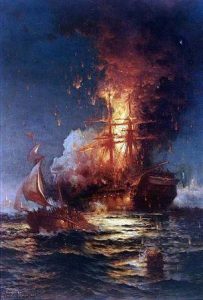 The Barbary Powers Wars were the first wars officially declared against America following our victory in the War for Independence. 1 Muslim terrorists from five different Islamic nations (Turkey, Tunis, Morocco, Algiers, and Tripoli) were making indiscriminate attacks against the property and interests of what they claimed to be “Christian” nations (America, England, France, Spain, Portugal, Denmark, Sweden, etc.). 2 These Muslim terrorists (called Barbary, that is, barbaric “pirates” by most Americans) attacked American civilian and commercial merchant ships wherever they found them, seizing the cargo and enslaving the crew. 3
The Barbary Powers Wars were the first wars officially declared against America following our victory in the War for Independence. 1 Muslim terrorists from five different Islamic nations (Turkey, Tunis, Morocco, Algiers, and Tripoli) were making indiscriminate attacks against the property and interests of what they claimed to be “Christian” nations (America, England, France, Spain, Portugal, Denmark, Sweden, etc.). 2 These Muslim terrorists (called Barbary, that is, barbaric “pirates” by most Americans) attacked American civilian and commercial merchant ships wherever they found them, seizing the cargo and enslaving the crew. 3
In 1784, Congress dispatched three diplomats – John Adams, Benjamin Franklin, and Thomas Jefferson – to negotiate with these Muslim nations and end the unprovoked attacks. 4 They found this to be a difficult task, for the attacking of ships and the taking of Christians by Muslims had been a widespread problem for centuries. 5
The Muslims found they could finance their wars and terror operations by enslaving and then selling captured seamen. (The Muslims took 1.25 million captive slaves in that period. 6) Because this was such a widespread and recurring problem, other Christian nations formed standing organizations to raise money to purchase enslaved seamen. As Jefferson explained:
There is here an order of priests called the Mathurins, the object of whose institutions is the begging of alms for the redemption of captives. About eighteen months ago, they redeemed three hundred, which cost them about fifteen hundred livres [$1,500] apiece. They have agents residing in the Barbary States, who are constantly employed in searching and contracting for the captives of their nation, and they redeem at a lower price than any other people can. 7
Ransoming Americans was no less expensive, and therefore was a very profitable trade for the Muslim terrorists. 8 Additionally, the Muslim nations would sign treaties with the attacked nations, including America, providing that for an annual “tribute” (perhaps $1 million a year, along with the “gift” of several frigates), that they would perhaps refrain from further attacks. By 1795, such “peace” payments to Muslim terrorists comprised a full sixteen percent of the entire federal budget! 9
Among the many treaties signed with Muslim nations during this period was the famous 1797 treaty with Tripoli. It was one of the many treaties in which each country officially recognized the religion of the other in an attempt to prevent further escalation into a “Holy War” 10 such as had existed between Christians and Muslims in the Middle Ages.
The Muslims considered that all Christian nations were like those of the Crusades, when Christians fought Muslims simply because they were Muslims. 11 However, America was definitely not like the European Christian nations from medieval times, for we did not kill Muslims, Jews, or any one else for their faith. In fact, many Founding Fathers talked about how different America as a Christian nation was from the European Christian nations; 12 and the American treaties, including the Treaty of Tripoli, made this very point.
Significantly, secularists regularly cite one clause from that treaty in devious attempts to make it appear that the Founding Fathers emphatically avowed that America was not a Christian nation. They thus quote from that treaty the line declaring “The government of the United States is in no sense founded on the Christian religion . . . ” This declaration certainly seems to be straightforward – until you discover that the critics only used part of the quote. Notice what the full, unedited clause states:
As the government of the United States of America is not in any sense founded on the Christian religion as it has in itself no character of enmity against the laws, religion or tranquility of Musselmen [Muslims]. and as the said States [America] have never entered into any war or act of hostility against any Mahometan nation, it is declared by the parties that no pretext arising from religious opinions shall ever produce an interruption of the harmony existing between the two countries. 13 (emphasis added)
This clause from the Treaty of Tripoli simply affirms that America was not one of the European Christian nations with an inherent hostility toward Muslims, and that America had never been part of arbitrary wars against Muslims such as had characterized the Crusades. This clause definitely does not deny or undermine America’s strong Christian heritage – unless you wrongly place a period in the middle of the sentence, as secularist critics do.
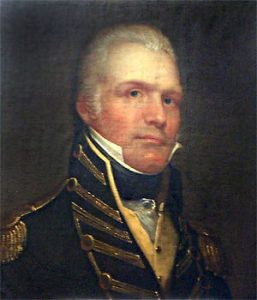 When Thomas Jefferson became president in 1801, he decided that it was time to take military action to end the two-decades-old unprovoked Muslim terrorist attacks against Americans. 14 Using the brand new American Navy to transport the U. S. Marines overseas (President George Washington had called for the construction of a navy in 1795, and President John Adams had overseen its construction 15), General William Eaton took the American military and proceeded to the same region of the world where Americans are still being attacked today. He then led a successful five-year campaign to free captured Americans and crush Muslim terrorist forces. 16 Tripoli (now called Libya) finally capitulated and signed a treaty on America’s terms in 1805, thus ending their aggressions – at least for a while. 17
When Thomas Jefferson became president in 1801, he decided that it was time to take military action to end the two-decades-old unprovoked Muslim terrorist attacks against Americans. 14 Using the brand new American Navy to transport the U. S. Marines overseas (President George Washington had called for the construction of a navy in 1795, and President John Adams had overseen its construction 15), General William Eaton took the American military and proceeded to the same region of the world where Americans are still being attacked today. He then led a successful five-year campaign to free captured Americans and crush Muslim terrorist forces. 16 Tripoli (now called Libya) finally capitulated and signed a treaty on America’s terms in 1805, thus ending their aggressions – at least for a while. 17
(By the way, it was from the Marine’s role in that first War on Terror from 1801-1805 that the U. S. Marines derive part of the opening line of their hymn: “From the halls of Montezuma to the shores of Tripoli . . .”)
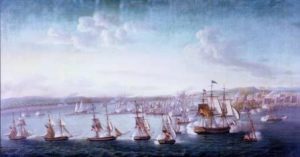 Shortly after President James Madison took office, he became engulfed in the War of 1812. With America preoccupied in a second war against the British, Algerian Muslim terrorists again began attacking Americans. But upon concluding the war with the British, President James Madison dispatched the American military and warships against three Muslim nations: Algiers, Tunis, and Tripoli. 18 America (with the assistance of Great Britain and the Netherlands) subdued those Muslim nations and brought them to the peace table, where they freed all the enslaved Christians. 19
Shortly after President James Madison took office, he became engulfed in the War of 1812. With America preoccupied in a second war against the British, Algerian Muslim terrorists again began attacking Americans. But upon concluding the war with the British, President James Madison dispatched the American military and warships against three Muslim nations: Algiers, Tunis, and Tripoli. 18 America (with the assistance of Great Britain and the Netherlands) subdued those Muslim nations and brought them to the peace table, where they freed all the enslaved Christians. 19
*On this date in history, the U.S.S. Enterprise captured the Trioplitan ship known as the Tripoli. While the terrorists sustained heavy losses, the Americans did not lose a single man in the battle. 20
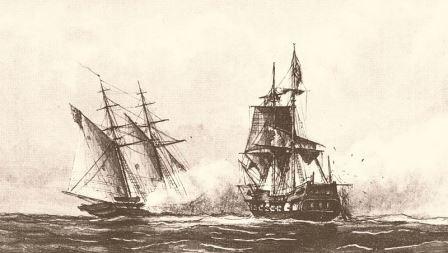
Endnotes
1 Thomas Clark, Naval History of the United States, from the Commencement of the Revolutionary War to the Present Time (Philadelphia: M. Stiles, 1814), 1:140; James H. Morgan, Register of the Military Order of Foreign wars of the United States (New York: The National Commandery, 1900), 11-19.
2 Richard O’Brian to Thomas Jefferson, June 8, 1786, Naval Documents Related to the United States Wars with the Barbary Powers, ed. Claude A. Swanson (Washington: United States Government Printing Office, 1939), 1:1-6; A General View of the Rise, Progress, and Brilliant Achievements of the American Navy Down to the Present Time, (Brooklyn: 1828) 70-71; “Barbary Pirates,” The Encyclopedia Britannica, ed. Hugh Chisholm (New York: The Encyclopedia Britannica Company, 1910), 383.
3 Julian Hawthorne et. al., United States from the Discovery of the North American Continent up to the Present Time (New York: James Schouler, 1894), 3:17-20; Forward written by President Franklin D. Roosevelt, December 30, 1958, Naval Documents, ed. Swanson (1939), 1; Theodore Lyman, The Diplomacy of the United States (Boston: Wells and Lilly, 1828), 2:338-342.
4 Thomas Jefferson to William Carmichael, November 4, 1785, The Writings of Thomas Jefferson, ed. Andrew A. Lipscomb (Washington, D. C.: The Thomas Jefferson Memorial Association, 1903), V:195; Garner W. Allen, Our Navy and the Barbary Corsairs (Boston: Houghton, Mifflin, and Company, 1905) 28.
5 “Barbary Pirates,” The Encyclopedia Britannica, ed. Hugh Chisholm (New York: The Encyclopedia Britannica Company, 1910), 383.
6 Robert Davis, Christian Slaves, Muslim Masters: White Slavery in the Mediterranean, the Barbary Coast and Italy, 1500-1800 (Palgrave Macmillan, 2004).
7 Thomas Jefferson to John Adams, January 11, 1787, The Writings of Thomas Jefferson, ed. Andrew A. Lipscomb (Washington, D. C.: The Thomas Jefferson Memorial Association, 1903), VI:47-48.
8 No. 43: Prisoners at Algiers, American State Papers: Documents, Legislative and Executive, of the Congress of the United States (Washington: Gales and Seaton), 1:100-101.
9 The federal budget was $6,115,000 in 1795; a payment of nearly $1 million was given that year to Algiers alone, not including what was given to the other Barbary Powers. See U. S. Department of Commerce, Bureau of the Census, Historical Statistics of the United States (White Plains, NY: Kraus International Publications, 1989), 1106; George Washington to the Secretary of the Treasury, May 29, 1794, The Writings of George Washington, ed. John C Fitzpatrick (Washington: Government Printing Office, 1940), 33:385.
10 See, for example, the 1786 Treaty with Morocco: Articles 10, 11, 17 and 24; the 1795 Treaty with Algiers: Article 17; the 1815 Treaty with Algiers: Article 13; the 1816 Treaty with Algiers: Articles 14 and 15; the 1796 Treaty with Tripoli: Article 11; the 1805 Treaty with Tripoli: Article 14; and the 1797 Treaty with Tunis: Forward.
11 Thomas Edward Watson, The Life and Times of Thomas Jefferson (New York: D. Appleton and Company, 1903), 247-249.
12 See for example, John Jay, “Address to the Annual Meeting of the American Bible Society,” May 8, 1823, Correspondence and Public Papers of John Jay, ed. Henry Johnston (New York: G. P. Putnam’s Sons, 1893), IV:491; John Quincy Adams, An Oration Delivered Before the Inhabitants of the Town of Newburyport at Their Request on the Sixty-First Anniversary of the Declaration of Independence (Newburyport: Charles Whipple, 1837), 17; John Adams in a speech to both houses of Congress, November 23, 1797, The Works of John Adams, Second President of the United States, ed. Charles Francis Adams (Boston: Little, Brown and Company, 1854), IX:121; Noah Webster, History of the United States (New Haven: Durrie & Peck, 1832), 339, “Advice to the Young”; Daniel Webster, Mr. Webster’s Speech in Defence of the Christian Ministry and In Favor of the Religious Instruction of the Young. Delivered in the Supreme Court of the United States, February 10, 1844, in the Case of Stephen Girard’s Will (Washington, DC: Gales and Seaton, 1844), 12-13.
13 Acts Passed at the First Session of the Fifth Congress of the United States of America (Philadelphia: William Ross, 1797), 43-44.
14 Thomas Jefferson, “Second Annual Message,” December 15, 1802, The Writings of Thomas Jefferson (Washington, D.C.: Taylor & Maury, 1854), 8:17; Thomas Jefferson, “Autobiography,” 1821, The Writings of Thomas Jefferson, ed. Paul Leicester Ford (New York: G.P. Putnam’s Sons, 1892), I:91-93; Elizabeth Huff, “The First Barbary War,” Monticello, accessed December 1, 2023.
15 “The Reestablishment of the Navy, 1787-1801,” Naval History Bibliography, accessed July 29, 2013.
16 William Grimshaw, The History of the United States, From Their First Settlement as Colonies to the Cession of Florida, in Eighteen Hundred and Twenty-One, (Philadelphia: Benjamin Warner, 1821), 194-195; Charles Prentiss, The Life of the Late Gen. William Eaton; Several Years an Officer in the United States’ Army, Consul at the Regency of Tunis on the Coast of Barbary, and Commander of the Christian and Other Forces That Marched from Egypt Through the Desert of Barca, in 1805, and Conquered the City of Derne, Which Led to the Treaty of Peace Between the United States and the Regency of Tripoli; Principally Collected from His Correspondence and Other Manuscripts (Brookfield: E. Merriam & Co., 1813).
17 “The Barbary Wars, 1801-1805,” The Mariners’ Museum: Birth of the U.S. Navy (2000).
18 John Quincy Adams, The Lives of James Madison and James Monroe (Buffalo: Geo. H. Derby and Co., 1850), 93; “Barbary Wars, 1801-1805 and 1815-1816,” U.S. Department of State: Office of the Historian, accessed July 25, 2013.
19 James Madison, “Seventh Annual Message,” December 5, 1815, The Writings of James Madison, ed. Gaillard Hunt (United States: G.P. Putnam’s Sons, 1908), VIII:33; Perceval Barton Lord, Algiers, with Notices of the Neighbouring States of Barbary, (London: Whittaker & Co., 1835), 50-60.
20 Garner W. Allen, Our Navy and the Barbary Corsairs (Boston: Houghton, Mifflin, and Company, 1905), 96; Naval Documents, ed. Swanson (1939), 1:538-540.
Still looking for answers? Visit our FAQ page
More Resources
Know the Truth and Protect Your Freedoms.
Still looking for answers? Visit our FAQ page
Stay Informed with the Latest Resources
Enter your email address to receive our regular newsletter, with important information and updates right in your inbox!

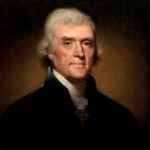 There is here an order of priests called the Mathurins, the object of whose institutions is the begging of alms for the redemption of captives. About eighteen months ago, they redeemed three hundred, which cost them about fifteen hundred livres [$1,500] apiece. They have agents residing in the Barbary States, who are constantly employed in searching and contracting for the captives of their nation, and they redeem at a lower price than any other people can.
There is here an order of priests called the Mathurins, the object of whose institutions is the begging of alms for the redemption of captives. About eighteen months ago, they redeemed three hundred, which cost them about fifteen hundred livres [$1,500] apiece. They have agents residing in the Barbary States, who are constantly employed in searching and contracting for the captives of their nation, and they redeem at a lower price than any other people can. 








